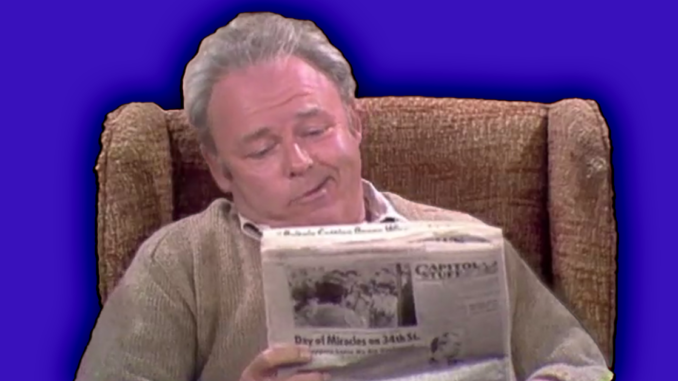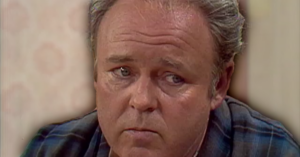
In Bill Gillespie, O’Connor finds a character arc closer to his heart.
Sometimes a character is so singular that the public will no longer accept an actor as anyone else. Careers can be negatively affected by an incredible performance if that role leads to typecasting. Worse yet, sometimes a role can be so inescapable that an actor no longer has his own identity. Countless times, there have been actors that do their jobs so well that we refuse to see them as anyone else.
These were the conditions under which Carroll O’Connor accepted the role of Bill Gillespie, the police chief of Sparta, Mississippi on In The Heat of the Night. It wasn’t a new role; viewers were familiar with the Gillespie character from the 1967 movie that shares a title with the series. O’Connor had his work cut out for him, as the film was well-remembered, with Rod Steiger’s Gillespie a part of one of cinema’s great quotes (it’s Steiger who sets up Sidney Portier to deliver the famous “They call me… Mr. Tibbs!”).
Another obstacle O’Connor faced was his association with Archie Bunker, arguably the most iconic sitcom character in TV history. By the 1988 premiere of In the Heat of the Night, O’Connor’s antiquated family man had only been off the air for five years, re-runs nonetheless. It was only natural that the public continued to see O’Connor as Archie.
In the Heat of the Night, like All in the Family before it, presented themes dealing with larger social issues. Primarily, the shows were similar in that they dealt with racism. There were some fundamental differences though. On All in the Family, Carroll O’Connor’s Archie Bunker is an island. He is stuck in his ways in a household filled with people who mostly do not share his beliefs. In the Heat of the Night, however, is set in the small-town south, and treats racism as endemic. There, O’Connor’s Gillespie was raised and surrounded by racists. Sparta is a racist town, and the police force is a microcosm of the town.
The key difference, though, is the arc. O’Connor’s Bill Gillespie begins the resentful series of Virgil Tibbs, the black Chief of Detectives. However, throughout the series, Gillespie grows closer to Virgil and the rest of the Tibbs family. By the end of the series, the once-racist Gillespie was married to a black councilwoman named Harriet DeLong.

Archie Bunker, though, was pretty uniform in his beliefs. “The funny thing about Archie is that he wouldn’t change his mind,” Bunker told the Los Angeles Times in 1994. “That was the fun, the comedy, and the satire. The world was a painful place to him. And because it was painful to him, it was funny to you. You get a kick out of watching a guy who was constantly in pain over things you took for granted.”
O’Connor was invigorated by the fact that he got to play a character a bit closer to his heart on In the Heat of the Night. “Yes. Sure. Archie wasn’t even close. Gillespie is a lot closer. Gillespie has changed his mind.”
Not everyone was thrilled about O’Connor playing someone so unlike Archie. One fan was so irate that she wrote to O’Connor about the prospect of the character’s interracial marriage. O’Connor’s response was simple: “What are they going to do? He likes her and she likes him.”
Says O’Connor: “People say ‘It’s curious. You were once playing a character who wouldn’t dream of this kind of a marriage.’ Well, the character I’m playing now wouldn’t dream of that kind of marriage either, but things happened to him that didn’t happen to Archie Bunker. A kind of insight and enlightenment happened to Gillespie happened to [Gillespie’s wife, Harriet DeLong]. They found they liked to be with each other an awful lot. And they were laughing at things together, a big step forward in a love relationship.”